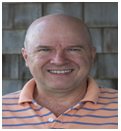Keynote speaker for Monday, July 31, 2017 :
Abstract: As the Internet of Things (IoT) matures and supports increasingly sophisticated applications, the research needs for IoT also expand considerably. This talk discusses major research challenges for the future IoT where billions or even trillions of devices are connected to the Internet. A brief discussion on the relationship of IoT, to Cyber Physical Systems (CPS), and Wireless Sensor Networks (WSN) is presented. Research topics covered include systems of systems, massive scaling, and humans in the loop. Examples of system of system issues from smart cities are presented. Scaling problems that require runtime validation are discussed. Realisms that must be addressed due to humans in the loop are highlighted. The list of topics is not meant to be comprehensive, but does address many of the main research issues. For some of the research problems, ideas for solutions and for promising research directions are also presented.
Bio : Professor John A. Stankovic is the BP America Professor in the Computer Science Department at the University of Virginia. He served as Chair of the department for 8 years. He is a Fellow of both the IEEE and the ACM. He has been awarded an Honorary Doctorate from the University of York. He won the IEEE Real-Time Systems Technical Committee’s Award for Outstanding Technical Contributions and Leadership. He also won the IEEE Technical Committee on Distributed Processing’s Distinguished Achievement Award (inaugural winner). He has seven Best Paper awards, including one for ACM SenSys 2006. He also has four Best Paper Runner Up Awards, including one for IPSN 2013. Stankovic has an h-index of 108 and over 44,700 citations. In 2015 he was awarded the Univ. of Virginia Distinguished Scientist Award, and in 2010 the School of Engineering’s Distinguished Faculty Award. He also received a Distinguished Faculty Award from the University of Massachusetts. He has given more than 40 Keynote talks at conferences and many Distinguished Lectures at major Universities. Currently, he serves on the National Academy’s Computer Science Telecommunications Board. He was the Editor-in-Chief for the IEEE Transactions on Distributed and Parallel Systems and was founder and co-editor-in-chief for the Real-Time Systems Journal. His research interests are in real-time systems, wireless sensor networks, smart and connected health, cyber physical systems, and the Internet of Things. Prof. Stankovic received his PhD from Brown University.
Keynote speaker for Tuesday, August 1, 2017:
Abstract: This talk describes several types of attacks aimed at content delivery networks (CDNs) and their customers, along with strategies for mitigating these attacks. The attacks range from simple but large-scale denial-of-service attacks to efforts to infiltrate bank accounts. The talk presents examples of real attack campaigns, and analyzes the effectiveness of the CDN operated by Akamai Technologies in protecting its customers from them.
Bio: Bruce Maggs received the S.B., S.M., and Ph.D. degrees in computer science from the Massachusetts Institute of Technology in 1985, 1986, and 1989, respectively. His advisor was Charles Leiserson. After spending one year as a Postdoctoral Associate at MIT, he worked as a Research Scientist at NEC Research Institute in Princeton from 1990 to 1993. In 1994, he moved to Carnegie Mellon, where he stayed until joining Duke University in 2009 as a Professor in the Department of Computer Science. While on a two-year leave-of-absence from Carnegie Mellon, Maggs helped to launch Akamai Technologies, serving as its first Vice President for Research and Development. He retains a part-time role at Akamai as Vice President for Research.
Maggs’s research focuses on networking, distributed systems, and security. In 1986, he became the first winner (with Charles Leiserson) of the Daniel L. Slotnick Award for Most Original Paper at the International Conference on Parallel Processing, and in 1994 he received an NSF National Young Investigator Award. He was co-chair of the 1993-1994 DIMACS Special Year on Massively Parallel Computation and has served on the steering committees for the ACM Symposium on Parallel Algorithms and Architectures (SPAA), the ACM Internet Measurement Conference (IMC), and the ACM HotNets Conference. He has served on the program committees of numerous ACM conferences including STOC, SODA, PODC, and SIGCOMM.
Keynote speaker for Wednesday, August 2, 2017:
Abstract:Telecom regulatory and policy agencies are facing a common set of challenges, colored by the specific legal and political circumstances in each country or region. I will highlight some of the hard problems that need to be addressed:
* From the 1980s to recently, either multi-modal competition (cable vs. DSL, say) or unbundling provided standard policy tools to encourage competition. Often, these policies could essentially leverage the fact that carriers could not predict the usage of their outside plant when they built it. However, the emergence of fiber and hybrid-fiber networks, as well as LTE and 5G, makes these policy tools less attractive.
* Until fairly recently, new applications could find new spectrum niches, possibly abandoned by older applications. These opportunities are harder and harder to find, particularly at trans-national scale. Thus, sharing and peaceful coexistence among neighbors become far more important.
* Broadband has become as necessary as water and electricity for most households. Providing access to low-density areas and to low-income populations remain challenging, particularly if public support is to be effective and efficient.
* Access also enables people with disabilities to enjoy functionally-equivalent communication, both amongst similarly-situated individuals and with people who can hear or see, businesses and government agencies. Relay services, text-to-911, real-time text and closed captioning not only support functionally-equivalent communication, but can also create new modes of universal communication.
* Finally, reaching emergency services via 9-1-1 or 1-1-2 remain key public services. How can we move these services from the TDM era to an all-IP environment, at reasonable cost and with improved reliability?
Bio: Prof. Henning Schulzrinne, Levi Professor of Computer Science at Columbia University, received his Ph.D. from the University of Massachusetts in Amherst, Massachusetts. He was an MTS at AT&T Bell Laboratories and an associate department head at GMD-Fokus (Berlin),before joining the Computer Science and Electrical Engineering departments at Columbia University. He served as chair of the Department of Computer Science from 2004 to 2009, as Engineering Fellow at the US Federal Communications Commission (FCC) in 2010 and 2011, and as Chief Technology Officer and Technical Advisor at the FCC from 2012.
He has published more than 250 journal and conference papers, and more than 70 Internet RFCs. Protocols co-developed by him, such as RTP, RTSP and SIP, are now Internet standards, used by almost all Internet telephony and multimedia applications. His research interests include Internet multimedia systems, ubiquitous computing, and mobile systems.
He is a Fellow of the ACM and IEEE, has received the New York City Mayor’s Award for Excellence in Science and Technology, the VON Pioneer Award, TCCC service award, IEEE Region 1 William Terry Award for Life time Distinguished Service to IEEE, the UMass Computer Science Outstanding Alumni recognition, and is a member of the Internet Hall of Fame.






